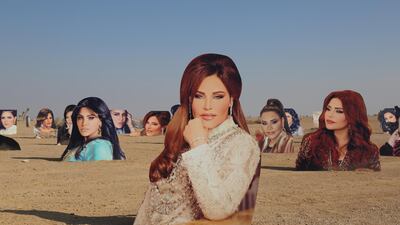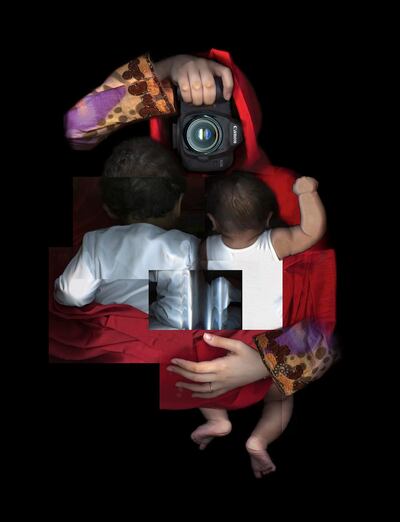It is a stereotype as damaging as it is outdated: the Muslim woman, living a life of suffering, oppression, inequality and exploitation, devoid of freedom of speech and independent thinking.
This is an image presented time and time again, particularly in the western media which has been slow to challenge ideas about women in the Middle East.
A major art exhibition however, aims to change perceptions by offering a window into the lives of women in the region, authored by themselves.
I AM is showcasing the work of 31 female artists in Jordan, Saudi Arabia, Iran, Yemen, Bahrain, Lebanon, Egypt, Tunisia, Iraq, Morocco, the UAE and the Palestinian terroritories. It is a celebration of dynamic women contributing to the fabric of local and global culture.
Billed as an East-West peace-building exhibition, in its bid to break down barriers and people's misconceptions, I AM is organised by international arts NGO, Caravan. Its patron is one of the most influential women in the Middle East – Jordan's Queen Rania Al Abdullah.
Queen Rania says: "I am amazed by the misconceptions about Muslim women and the Arab world that I hear, and that really hurts me.
"I hope that as this exhibition opens in cities worldwide, and people look through this window into our lives, they see what I see – what I've always known: that the people of the Middle East are as warm and welcoming as they are generous and open-minded.
"And that, today, perhaps more than ever, they are eager to forge friendships beyond their own borders in the name of a stronger, more harmonious global family."
I AM premiered in Amman, Jordan, in May and opened in London, at the church of St Martin-in-the-Fields in Trafalgar Square, earlier this month. The opening address was made by Vanessa Branson, founder of Marrakech Biennale, a festival which aims to build bridges between cultures through art.
The sister of the British businessman, Richard Branson, she says although she was hesitant to speak about gender and religion, she believes there are defining characteristics to women's art that are emphasised by female artists from the Islamic world.
"In some, and obviously not all, cases there's a different sensibility in art made by women, an underlying emotional empathy, a certain vulnerability," says Branson. "Women's comparative lack of physical strength, their fragility, is often expressed with both their subject matter and use of materials.
She notes that in the Mena region, "the tradition of women bearing the weight of all domestic drudgery has resulted in many great works of art using everyday household objects to express the suffering caused by the inequality of their burden".
Referencing the work of Iranian artist Shadi Ghadirian – whose witty photographs of women in traditional dress show irons or cheese graters exchanged for the grill of the chador – Branson says the nature of being an artist is someone prepared to take risks.
Through her work with the Marrakech Biennale, Branson has come into contact with some of the most exciting female artists in the region. She has worked with Maha Malluh, Yto Barrada, Bouchra Khalili and the late photographer Leila Alaoui, who was killed in a terrorist attack in Ouagadougou, Burkina Faso, in January last year, at the age of 33.
"Working in the art world alongside these extraordinary women has been a continuous exploration and adventure," Branson says. "It has also been immensely rewarding to witness how the creative movement in North Africa and the Middle East is changing the identity of the region.
"We can't deny that there is a tension between the darker forces, those who wish to destroy this growing cultural identity, and the enlightened majority who understand the role that culture plays in driving forward innovation and hope.
"I'm confident that artists, with their vision and courage, are going to drive us towards an exciting, thought-provoking and, inshallah, a more harmonious world."
Sir Derek Plumbly, chairman of The Arab British Centre, described the blossoming of the arts scene in Saudi Arabia and the Gulf as "extraordinary".
At I AM's exhibition opening in London, he said: "What is special about this exhibition however, indeed its raison d'être, is that the artists do not just happen to be women but that they are training their gaze on themselves.
"In doing so they illustrate - literally - just how far removed from the stereotypes women in the Middle East are, and how creative and diverse they are."
I AM is at St Martin-in-the-Fields, Trafalgar Square, London, until August 20. It will tour the United States next year. Go to www.oncaravan.org/i-am-exhibition


